Spotlight on a Swiss Biomedical Technician working at sea
This article focuses on the life of an electronics Hardware Engineer transitioning to life as a Biomedical Technician working at sea. Christoph Nerz worked in Switzerland, most recently for the Swissphone Group, and on Mercy Ships as an Electronics Technician. Last year he transitioned to Biomedical Engineering and is living and working with his family on Mercy Ships.
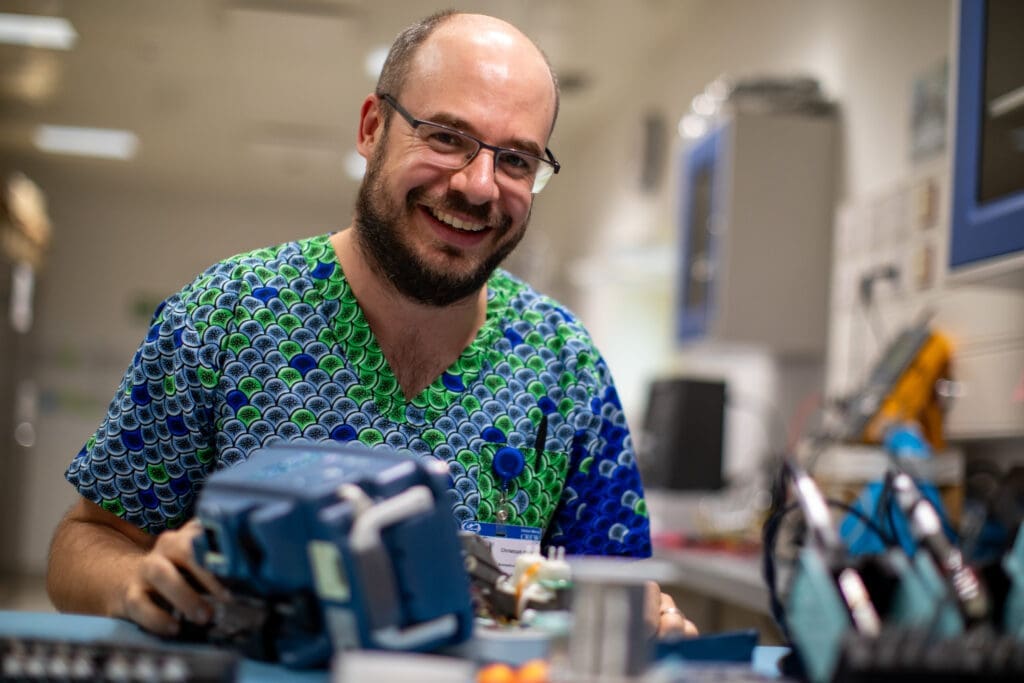

Full life Of a Biomedical Technician working on Mercy Ships
Background
Did anyone in your family or school suggest a career in electronics engineering?
In Switzerland we have the system that most people learn a job by doing an apprenticeship. That starts at around the age of sixteen after finishing the 9 years of mandatory school. As a student you are hired at a company where you work for them in your job. But there is at least one day of school and study.
An electronics technician apprenticeship in Switzerland takes 4 years and during the two first years half the week is at school and the other half in a training programme for apprentices. So that way my coworkers did not have to start at zero when explaining, when I joined them in the R&D department.
I was very much into computers and computer games at that age, so I clearly had a technical interest, but I also considered graphic design as a career. I basically chose electronics over IT and kept the computers as a hobby.
Nobody in my family suggested it. In hindsight I believe I made a good choice back then. Plus because of my interest in design, I was able to live in different ways like PCB design (layout of printed circuit boards), CAD and as a hobby I love photography.
Career in PCB layout and electronics
You gained experience with different products from smart meters to sensors and paging. Does working on different products make you a better engineer and why?
I believe it helps you a lot to have wide experience when working as a Biomed.
You can also widen your experience in the same company by being interested in what the other departments do. For example, if you work in hardware development as I did, then the other departments around you are the firmware team, the mechanical design, procurement, testing and production.
After working for quite a big company – Landis+Gyr, I started a new job at SIKO where there were just two people at the beginning developing new products.
At a new job like that you have a lot of opportunities to learn things. With production next door In-House, I not only had the chance to see how we manufactured our sensors, I was also one of the people who helped troubleshoot if something wasn’t working.
And because we had no dedicated person for the mechanical design, I also got the opportunity to learn a CAD tool.
What are the core skills you developed and use in all your work?
I believe one of the core skills is to be curious about how things work. If you stay curious and you are never satisfied with a quick fix, I believe that is when you learn the most.
And if you have experienced people around you, take the opportunity to ask questions. To know how to get to the missing piece of information is key.
Languages
You speak English, German, Swiss German as well as some French and Spanish. Do you think that speaking more than one language makes you a better communicator?
Learning languages wasn’t my favourite subject during school. I was always more interested in maths and science topics. My least favourite subject was learning French.
Working in the technical field in Switzerland, there is no way around English. So, I was motivated to learn English. Plus with living on board the Africa Mercy and now the Global Mercy, where we all speak English, it just becomes normal.
Living in Africa and sometimes in the Canaries with the ships showed me that even French and Spanish can be very helpful.
Speaking other languages for sure helps to be aware of the differences in what we understand. And communicating across different cultures, is something where you can definitely practice your communication skills, and also make many mistakes.
I believe communication skills are quite important for a Biomed in our setting. Gathering information before starting troubleshooting can save a lot of time. Plus being in touch with the users makes a big difference.
Retraining and Working as a Biomedical Technician
You retrained as a Biomedical Technician in 2023. Why did you decide to do this?
I was working on board the Global Mercy as an electronics technician in the engineering department and we were always looking for Biomeds. Being part of the electrician’s team I did not do as much with electronics as I wished I could. So, I asked if there was an option to change the department.
And doing a course remotely with the College of Biomedical Equipment Technology helped me to fill some of the gaps I obviously had, as I didn’t come from the medical field.
How easy was it to study again? What is your advice to other people returning to studying?
For me it helped a lot that it wasn’t full time study. I am a learning by doing person. So, combining the practical work in the Biomed department on board with studying was a good solution for me.
However, studying in English was something new to me, but over time I got very used to it.
It was also helpful, that I could set some dedicated time aside to study.
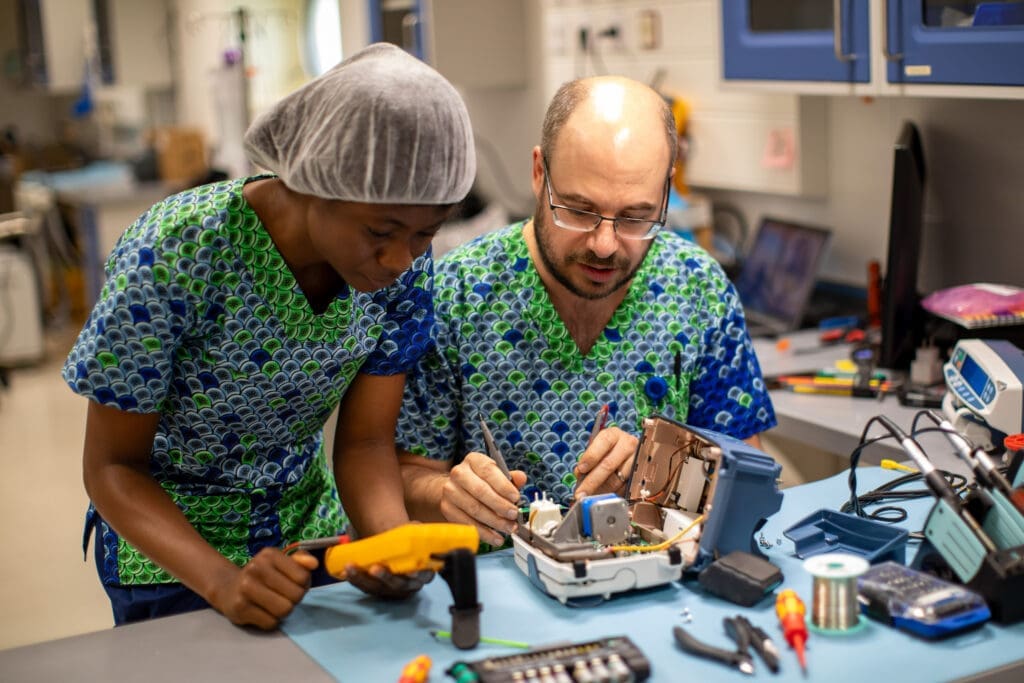

Transferable and new skills used working as a Biomedical Technician
How many of your skills are transferable?
Most skills are transferable in one or the other way. There is of course a lot of specialised knowledge that I won’t use daily. But the underlying skills are very transferable.
For example, how to use the layout tool Altium Designer, won’t help me much as a Biomed, because we most likely never design our own PCBs on board. But in order to use this tool effectively I did a lot of work in the library of the tool, and that transfers well to the computerised maintenance management system (CMMS) we use for our parts and equipment.
Which new things did you need to learn?
Anatomy and physiology was definitely one of the courses where I learned a lot of new things.
As well, all the devices where medical gases or water are involved were things where I had little experience.
There are many different devices around the hospital that over time I am getting to know more and more.
I believe the learning never stops, so it is nice if my first response isn’t right straight away so that I need to read the manual, especially when I get a question from a user.
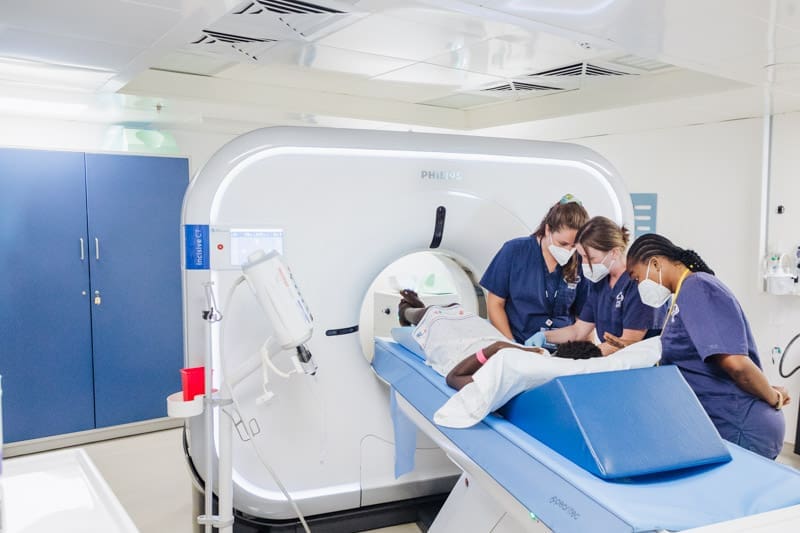

Typical week on board ship working as a Biomedical Technician
What’s your typical week like when you are on board the Global Mercy?
We work Monday to Friday from 08:00 to 17:00. The biggest difference in terms of working hours is, that I meet my family for lunch. Plus I don’t have to drive to work, I just have to walk down to deck three where we have our Biomed workshop. (our family lives on deck 9)
The other big difference is that we start working with a prayer in the team or with a devotion.
One person from the team is always on call in case we need technical support in the hospital. We share this within the team as it also includes the weekends. However, usually there isn’t that much happening, as long as we keep up with our work during our normal work hours.
How much of your time is spent working with equipment and how much with admin and other tasks?
For me as a regular Biomedical Technician who isn’t leading the team, I spend most of my time on things that are at least related to the equipment. But that can also mean that I am working on the test procedure for equipment or receiving parts and organising our storage.
We don’t have to bill our hours anywhere, but we do work with a CMMS where we document all our equipment, parts, and our maintenance.
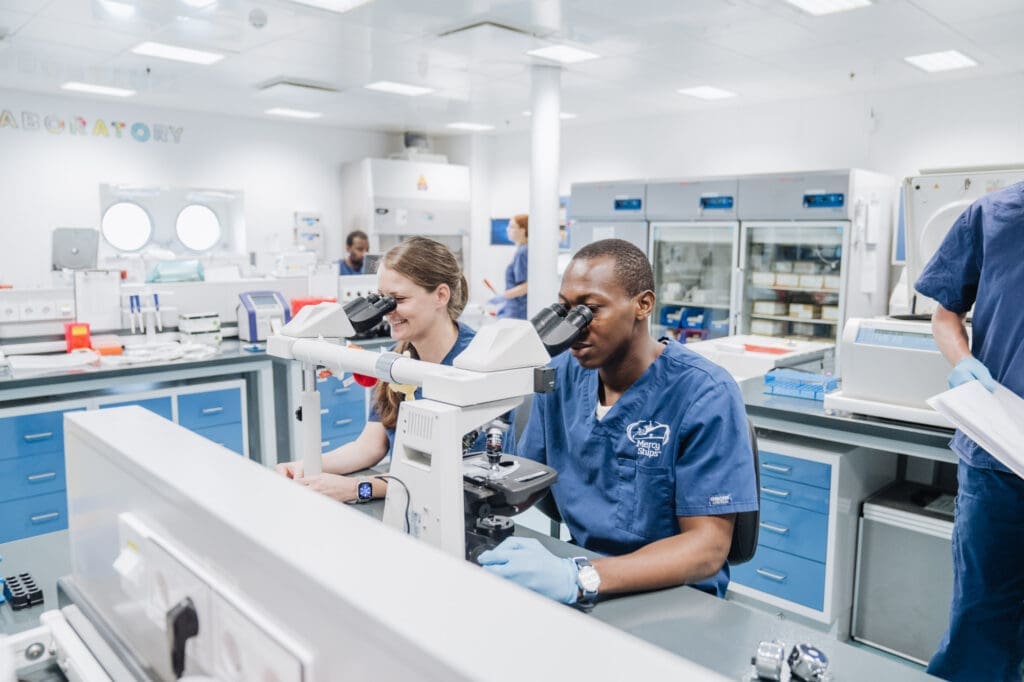

How do you balance your work with time for your family?
We have two daughters (5 years and 7 months old). The balance isn’t easy anywhere. On board it can be tempting to just work longer. However, overall I probably see my family more than at home since we are working and living in the same place.
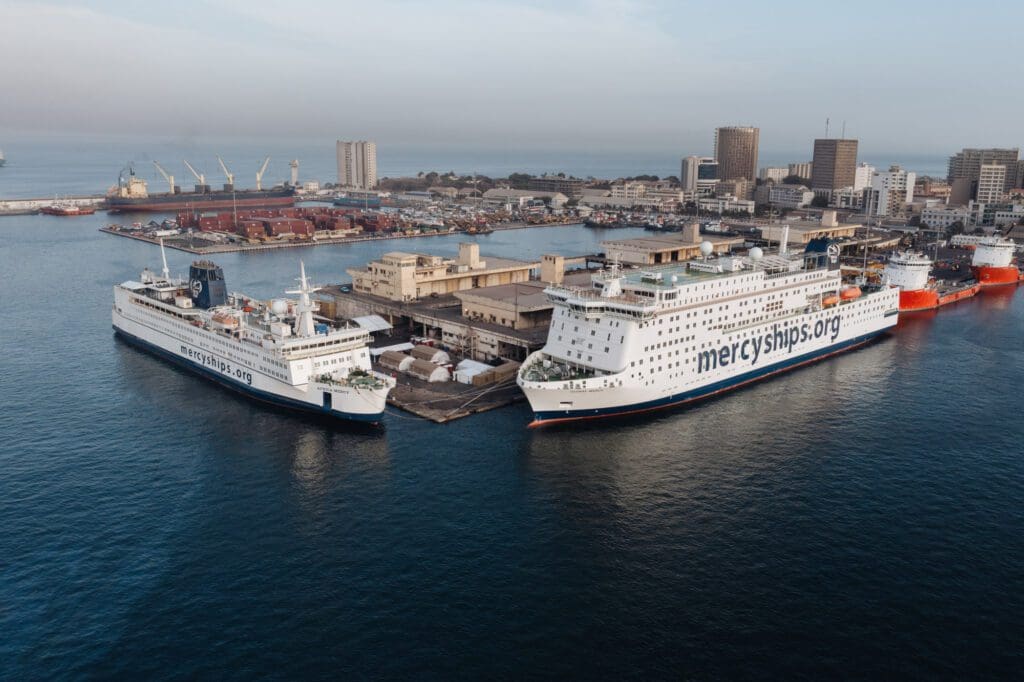

Troubleshooting while working as a Biomedical Technician
When you are on the ship, you don’t have easy to access to information and parts. How do you troubleshoot?
We try to have the service manuals in our system, and we also make sure we have connections to the vendors to get the information we need.
The biggest difference to a western hospital is that it usually takes longer to receive parts and it is hard to get service technicians to help us in Africa.
That means we sometimes go further with the troubleshooting or repair, than you would if you had someone to show up and do it for you. Plus with complicated logistics it is also more often worth repairing things.
How do you personally tackle a problem with equipment when it is not easy to fix?
If something turns out to be not easy to fix, that means that the first few attempts didn’t fix the problem.
So, I take a step back and check if I gathered the right information (from the users or the manuals). Maybe it is time to call for help, or otherwise continue step by step ruling out certain things that could have been the issue.
In my experience the seven steps of troubleshooting are a great guide.
- Identify the Problem
- Identifying the Probable Cause
- Plan to solve the problem
- Resolving the Problem / Verify Resolution
- Re-engaging the issue
- Mitigate future issues
Working with Mercy Ships
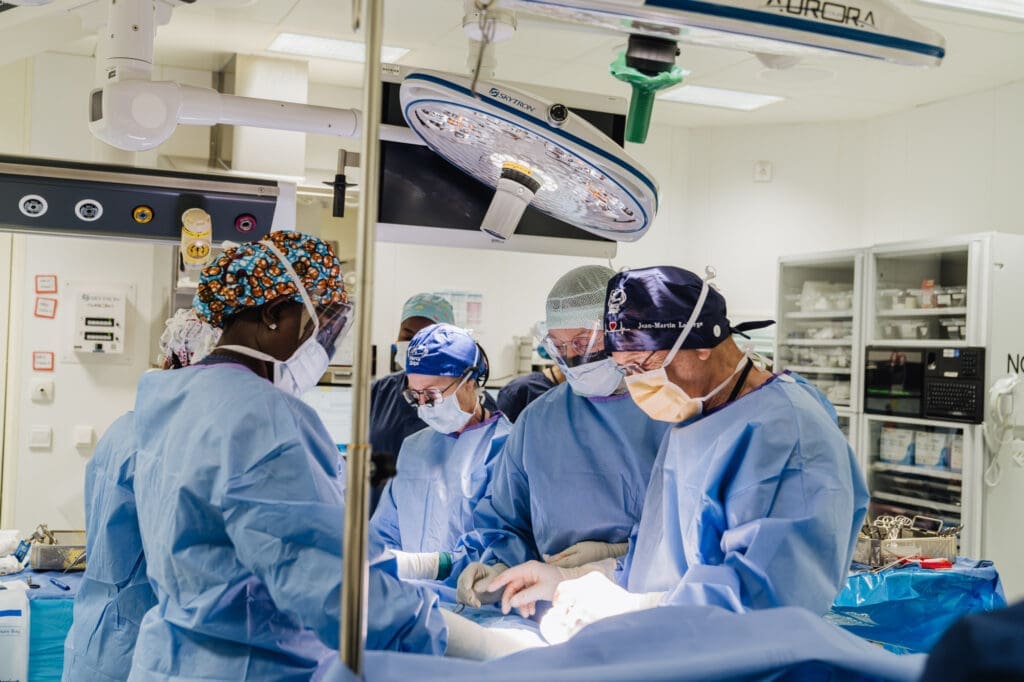

Why would you recommend working on Mercy Ships as an engineer or technician?
Working on board the Africa Mercy or the Global Mercy is a unique experience. We have crew from all over the world working and living together. Living in community was also the part, we probably missed the most, after returning from our first two years assignment with Mercy Ships to Switzerland in 2017.
Technical crews are essential to keep the ship and the equipment on board running and in good shape. Also, to know, that with my contribution life changing surgery is possible for our patients is great motivation.


More people working as a Biomedical Technician or Engineer
Spotlight on life of a Biomedical Engineer in the UK


Responses